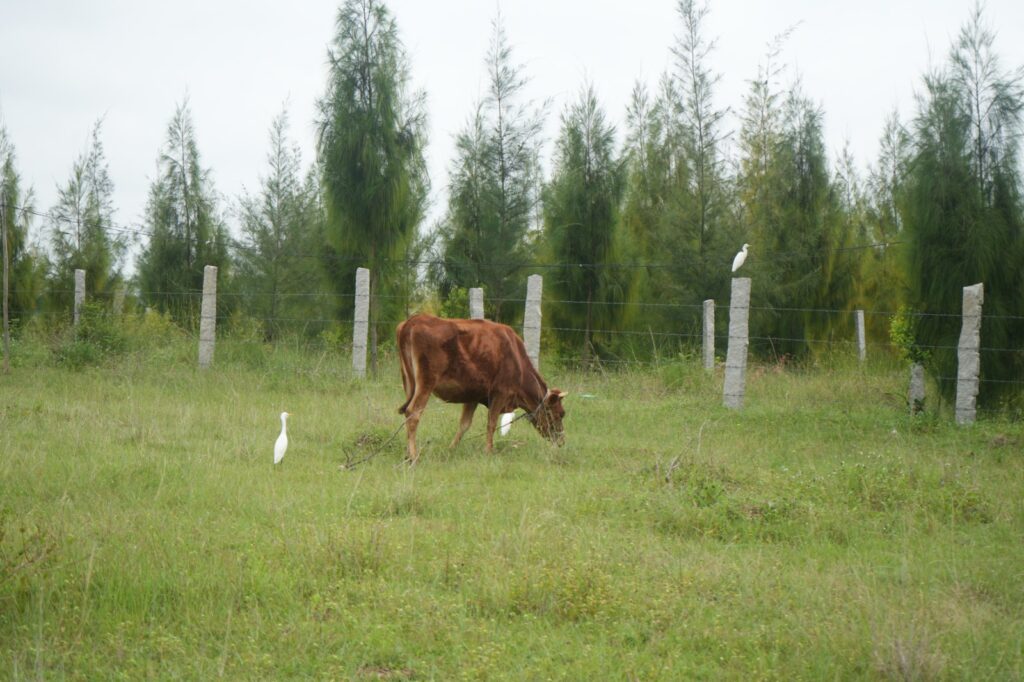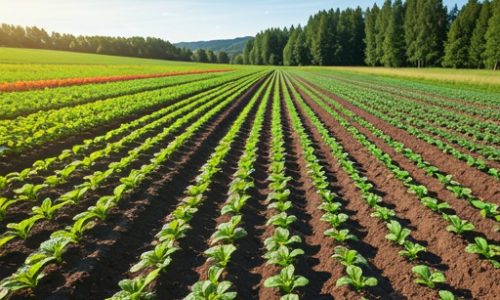In the face of rapid urbanization and environmental degradation, the need for sustainable land management has never been more critical. Managed farmland serves as a dynamic solution to restore natural ecosystems, promote biodiversity, and create lasting positive environmental change.
At Utopiaa, our approach to managed farmland is built around these core principles, ensuring that each plot not only benefits landowners but also contributes to the broader goal of environmental preservation. Through eco-conscious farming practices, reforestation, and agrotourism, we’re building sustainable landscapes that nurture both the land and its people.
In this blog, let’s explore how Utopiaa’s managed farmland projects are specifically designed to create significant environmental impact and drive positive change in Karnataka.
Managed farmland is a unique model of land ownership and stewardship that prioritizes ecological health. This approach combines sustainable agriculture with expert land management to preserve soil quality, reduce pollution, and support local ecosystems. Unlike traditional farmland, where productivity often comes at the expense of the environment, managed farmland considers long-term impacts, ensuring that each plot sustains its natural resources while producing valuable crops.
At Utopiaa, our managed farmland model brings together the benefits of agricultural productivity with eco-friendly practices. We envision a future where individuals can own farmland that thrives sustainably, supporting soil health, water conservation, and biodiversity. This commitment forms the backbone of our projects across Karnataka, where each managed farmland is cultivated with an eye toward positive environmental impact.

Healthy soil is the foundation of sustainable agriculture and a vital part of any ecosystem. In managed farmland, soil is treated as a renewable resource, with practices in place to maintain and improve its quality over time. Our approach to soil health includes organic farming methods, crop rotation, natural composting, and minimal tillage to avoid soil erosion.
The importance of healthy soil goes beyond just plant growth. By nurturing soil, we also support the ecosystem within it, including beneficial microbes, earthworms, and other organisms that enrich its fertility. With soil-friendly practices, Utopiaa’s managed farmland projects create conditions that naturally improve crop yield, while also reducing the need for synthetic fertilizers and pesticides. This approach not only minimizes pollution but also ensures that the land remains fertile for generations to come.
Water conservation is at the core of sustainable agriculture, especially in regions where water scarcity is a growing concern. Our managed farmland projects are equipped with efficient irrigation systems, rainwater harvesting, and water recycling methods that reduce water waste and ensure that every drop is used effectively.
For us, water conservation goes beyond maintaining productivity. We aim to create self-sustaining water ecosystems on our farmland plots that can support agriculture, biodiversity, and even withstand dry seasons without excessive reliance on external resources. Efficient irrigation practices, such as drip irrigation, ensure that water reaches the root zones of plants directly, reducing evaporation and water runoff. This meticulous water management system not only conserves water but also contributes to overall land resilience.
Biodiversity is essential to ecosystem health, and managed farmland provides an ideal environment to support diverse plant and animal life. By cultivating a variety of crops and native plant species, we create habitats that attract pollinators, birds, and other wildlife. Managed farmland is not just about producing crops; it’s about creating a thriving ecosystem that promotes natural balance.
At Utopiaa, we prioritize biodiversity by integrating native plants, which require fewer resources and provide food and shelter for local wildlife. These plants play a crucial role in preventing soil erosion, retaining moisture, and enhancing the fertility of the land. By fostering biodiversity, we create a balanced ecosystem that not only supports agriculture but also enriches the environment as a whole.
Climate change is one of the most pressing global issues, and reforestation plays a vital role in mitigating its effects. Managed farmland provides a unique opportunity for carbon sequestration, where the land is actively managed to capture and store carbon dioxide through plant growth and soil processes.
At Utopiaa, we are committed to planting native tree species and encouraging reforestation on managed farmland. Trees are essential to reducing atmospheric carbon, and our projects contribute to this goal. Our commitment to reforestation goes hand in hand with promoting local biodiversity, as we plant species that are not only efficient at carbon capture but also support local ecosystems.

One of the environmental challenges in agriculture today is the heavy use of chemical fertilizers and pesticides, which can lead to soil degradation, water pollution, and harm to beneficial insects. Managed farmland offers a solution by implementing organic farming practices that minimize or eliminate chemical inputs. At Utopiaa, we focus on natural pest control methods and soil amendments that improve fertility without damaging the ecosystem.
This commitment to organic practices is not only healthier for the land but also contributes to cleaner water sources and reduces air pollution. By avoiding harmful chemicals, we create a safe environment for pollinators like bees and butterflies, which are essential for crop production and biodiversity.
Natural pest management techniques, such as companion planting and using beneficial insects, allow us to maintain a healthy balance within the ecosystem, promoting crop health and reducing environmental risk.
The concept of a circular economy—where resources are reused and waste is minimized—is integrated into our managed farmland practices. At Utopiaa, we see each farmland as part of a larger ecosystem where resources are carefully cycled and reused. Composting, water recycling, and waste reduction efforts align with our commitment to sustainability, creating a self-sustaining cycle that reduces environmental impact.
In a circular economy model, every resource has a purpose, and waste is seen as an opportunity for renewal. Organic waste from our crops, for instance, is composted and returned to the soil, enriching it and supporting new growth. This approach not only reduces waste but also reinforces our environmental values, allowing managed farmland to serve as a sustainable model for future agricultural practices.
In a world facing increasing food security challenges, managed farmland stands out as a critical asset for resilient food systems. By focusing on sustainable farming practices, Utopiaa ensures that each plot is a productive yet environmentally friendly source of food. This approach minimizes the depletion of natural resources, ensuring that the land can continue to produce food for future generations.
Through crop diversity, soil management, and responsible water use, managed farmland contributes to food security without compromising ecological health. We believe that every plot of managed farmland is a step toward a sustainable food system that can withstand environmental changes and reduce dependency on unsustainable farming practices.
At Utopiaa, we envision managed farmlands as a sustainable investment and an integral part of a lifestyle that values and protects the environment. Our projects offer individuals a tangible way to contribute to eco-friendly practices without needing to manage the land themselves. For those who seek to make a positive environmental impact, owning a managed farmland plot provides an opportunity to live out these values, all while ensuring the land is carefully maintained and used responsibly.
The benefits of sustainable living extend beyond the land itself. Engaging with eco-friendly spaces and being part of a managed farmland project allows individuals to adopt a lifestyle that aligns with nature. By investing in managed farmland, you’re choosing a path that minimizes your environmental footprint, supports biodiversity, and builds a legacy rooted in sustainability.
The cumulative impact of managed farmland practices on soil, water, and air quality is profound. Soil enriched through organic practices acts as a carbon sink, absorbing more CO₂ and helping reduce atmospheric carbon levels. Our water conservation techniques prevent runoff that might otherwise carry pollutants into nearby rivers and lakes, ensuring that our surrounding ecosystems remain clean and undisturbed.
Air quality also benefits from managed farmland. Unlike traditional agriculture that may release harmful emissions from chemical use, Utopiaa’s organic practices and reforestation efforts contribute to cleaner air. Trees and plants act as natural air purifiers, capturing pollutants and producing oxygen. By managing farmlands with an emphasis on environmental health, we’re actively creating spaces that contribute to the overall well-being of the planet.
Managed farmland isn’t just a plot—it’s part of a broader, interconnected landscape that supports resilient communities. Our projects contribute to the local economy by creating jobs, promoting eco-tourism, and providing sustainable agricultural products. This integrated approach strengthens communities, fostering a sense of connection between people and the land they live on.
In regions like Karnataka, managed farmland has a unique role to play in empowering rural communities. Through responsible land management and sustainable agriculture, Utopiaa’s projects create job opportunities, enhance food security, and provide education on eco-friendly practices. By supporting local economies, we’re contributing to community resilience, where the benefits of managed farmland extend to everyone involved.
One of the most powerful aspects of managed farmland is its capacity to promote regenerative agriculture, which goes beyond simply sustaining resources to actively restoring them. Regenerative agriculture involves practices that replenish soil, enhance biodiversity, and restore ecological balance. This approach helps reverse environmental degradation caused by conventional farming practices.
At Utopiaa, we incorporate regenerative principles in each managed farmland project, ensuring that every plot becomes more productive and ecologically healthy over time. From implementing crop rotations to building soil organic matter, our practices create a regenerative cycle that nurtures the land. By choosing managed farmland, you’re not only preserving natural resources but also participating in an agricultural revolution that prioritizes ecological healing.
Investing in managed farmland is more than a financial decision—it’s an opportunity to create a legacy of sustainable land stewardship. By supporting environmentally responsible farming, each landowner contributes to a collective effort that values the planet and prioritizes the health of future generations. Land stewardship involves protecting and improving the land, ensuring it remains vibrant, productive, and resilient for years to come.
At Utopiaa, we see each plot as part of a shared mission to protect and enhance the environment. Managed farmland embodies our commitment to land stewardship, where every decision is guided by a respect for nature and a dedication to sustainability. Owning managed farmland allows individuals to leave a positive mark on the world, shaping a future where eco-friendly practices are the standard, not the exception.
Managed farmland offers a transformative approach to land ownership and environmental impact, where each plot plays an essential role in preserving and enriching our natural ecosystems. By choosing managed farmland, individuals don’t just invest in land—they actively participate in a larger vision of ecological renewal and stewardship. With Utopiaa’s focus on sustainable practices, biodiversity, and community resilience, every plot becomes part of a broader commitment to the planet’s health, promoting balance and harmony within the environment.
Through our managed farmland model, we empower individuals to own land that not only holds financial value but also nurtures the Earth and its ecosystems for generations to come. This approach is about creating a lasting impact, where each choice contributes to reforestation, soil health, clean water, and the flourishing of local wildlife. By partnering with Utopiaa, you join a movement that seeks to heal the land, restore biodiversity, and foster sustainable communities, ultimately leaving a positive legacy for future generations.
Are you ready to make an impact? Join us at Utopiaa.in and discover how managed farmland can be a part of your legacy. Together, let’s drive meaningful environmental change and build a greener, more resilient future.